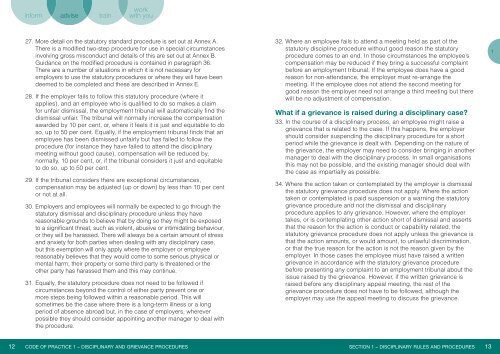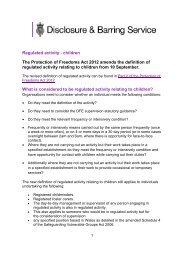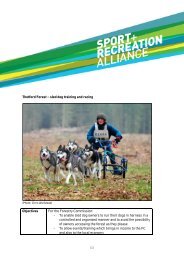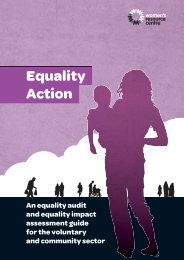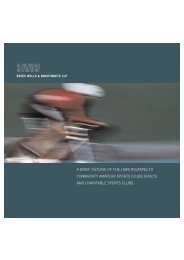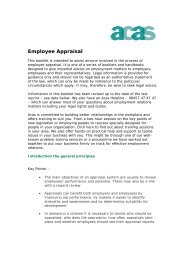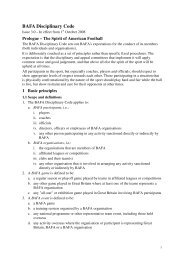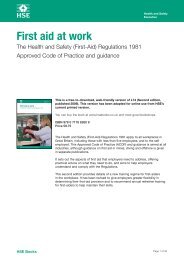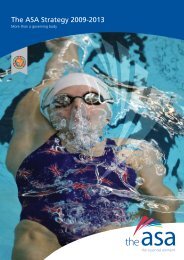Disciplinary & Grievance Procedures - Acas
Disciplinary & Grievance Procedures - Acas
Disciplinary & Grievance Procedures - Acas
You also want an ePaper? Increase the reach of your titles
YUMPU automatically turns print PDFs into web optimized ePapers that Google loves.
27. More detail on the statutory standard procedure is set out at Annex A.There is a modified two-step procedure for use in special circumstancesinvolving gross misconduct and details of this are set out at Annex B.Guidance on the modified procedure is contained in paragraph 36.There are a number of situations in which it is not necessary foremployers to use the statutory procedures or where they will have beendeemed to be completed and these are described in Annex E.28. If the employer fails to follow this statutory procedure (where itapplies), and an employee who is qualified to do so makes a claimfor unfair dismissal, the employment tribunal will automatically find thedismissal unfair. The tribunal will normally increase the compensationawarded by 10 per cent, or, where it feels it is just and equitable to doso, up to 50 per cent. Equally, if the employment tribunal finds that anemployee has been dismissed unfairly but has failed to follow theprocedure (for instance they have failed to attend the disciplinarymeeting without good cause), compensation will be reduced by,normally, 10 per cent, or, if the tribunal considers it just and equitableto do so, up to 50 per cent.29. If the tribunal considers there are exceptional circumstances,compensation may be adjusted (up or down) by less than 10 per centor not at all.30. Employers and employees will normally be expected to go through thestatutory dismissal and disciplinary procedure unless they havereasonable grounds to believe that by doing so they might be exposedto a significant threat, such as violent, abusive or intimidating behaviour,or they will be harassed. There will always be a certain amount of stressand anxiety for both parties when dealing with any disciplinary case,but this exemption will only apply where the employer or employeereasonably believes that they would come to some serious physical ormental harm; their property or some third party is threatened or theother party has harassed them and this may continue.31. Equally, the statutory procedure does not need to be followed ifcircumstances beyond the control of either party prevent one ormore steps being followed within a reasonable period. This willsometimes be the case where there is a long-term illness or a longperiod of absence abroad but, in the case of employers, whereverpossible they should consider appointing another manager to deal withthe procedure.32. Where an employee fails to attend a meeting held as part of thestatutory discipline procedure without good reason the statutoryprocedure comes to an end. In those circumstances the employee’scompensation may be reduced if they bring a successful complaintbefore an employment tribunal. If the employee does have a goodreason for non-attendance, the employer must re-arrange themeeting. If the employee does not attend the second meeting forgood reason the employer need not arrange a third meeting but therewill be no adjustment of compensation.What if a grievance is raised during a disciplinary case?33. In the course of a disciplinary process, an employee might raise agrievance that is related to the case. If this happens, the employershould consider suspending the disciplinary procedure for a shortperiod while the grievance is dealt with. Depending on the nature ofthe grievance, the employer may need to consider bringing in anothermanager to deal with the disciplinary process. In small organisationsthis may not be possible, and the existing manager should deal withthe case as impartially as possible.34. Where the action taken or contemplated by the employer is dismissalthe statutory grievance procedure does not apply. Where the actiontaken or contemplated is paid suspension or a warning the statutorygrievance procedure and not the dismissal and disciplinaryprocedure applies to any grievance. However, where the employertakes, or is contemplating other action short of dismissal and assertsthat the reason for the action is conduct or capability related, thestatutory grievance procedure does not apply unless the grievance isthat the action amounts, or would amount, to unlawful discrimination,or that the true reason for the action is not the reason given by theemployer. In those cases the employee must have raised a writtengrievance in accordance with the statutory grievance procedurebefore presenting any complaint to an employment tribunal about theissue raised by the grievance. However, if the written grievance israised before any disciplinary appeal meeting, the rest of thegrievance procedure does not have to be followed, although theemployer may use the appeal meeting to discuss the grievance.112 CODE OF PRACTICE 1 – DISCIPLINARY AND GRIEVANCE PROCEDURES SECTION 1 – DISCIPLINARY RULES AND PROCEDURES 13


